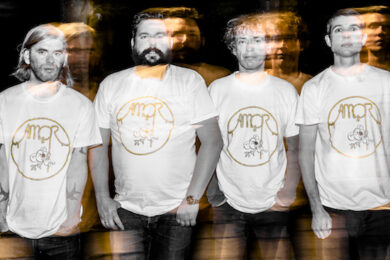“My son listens to a lot of beat-oriented music, and I must say, I worry about the mental health of a lot of these young artists”, reveals Richard Youngs, with a typical sense of empathy and curiosity. “It all seems like it has an incredibly negative world outlook. But then, I’m no expert on that, and it’s a different world.”
Indeed, the sometimes lethargic landscape of contemporary trap and hip hop are some of the few remaining musical corners that the hugely prolific musician has not dabbled in over the past three decades. Perhaps in subliminal response to his son’s listening habits, Youngs’ latest collaborative project, the balearic-tinged disco quarter Amor, have specifically had any traces of negativity drained from their fibre in a shimmering disco sieve. Following a number of singles, Sinking Into A Miracle is a wistful and necessarily optimistic dance record, one that does a more than worthy job at appropriating the heady spirits of classic New York dance parties such as The Loft and Paradise Garage, while injecting it’s slow-building grooves with distinctly Glaswegian DIY funk.
Based in Glasgow, Young’s vast back catalogue of analogue recordings position him as a formidable talent, a keen collaborator and a figure not unafraid to make himself vulnerable whenever faced with a multi-track recorder. And while Youngs isn’t necessarily an artist in search of a hit, with Amor, he scored one nonetheless. Quickly disappearing on vinyl, ‘Paradise’ was a sophisticated but unpretentious club anthem, one that spoke explicitly to the timeless but recently renewed themes of community, personal transcendence and good old-fashioned dance floor melancholy. Evoking the spirit of Arthur Russell and Talking Heads without misunderstanding their influence, ‘Paradise’ could easily have been a freshly cut dub plate, discreetly passed over to David Mancuso in the small hours.
The pristine, warm and resolutely human sound of Amor becomes less surprising, if no less intoxicating, when the listener learns of the men behind it. In this case, joining Youngs, arguably producing his most direct and linear work in years, is Franz Ferdinand drummer Paul Thomson, celebrated improvisator Luke Fowler, and the remarkable Norwegian bassist, Michael Francis Duch.
“We’re four very strong individuals coming from four very different places, and that is a strength”, considers Youngs, rejecting the admittedly silly mythology that he has formed some kind of alternative disco super group. “That’s sort of the PR strap line, isn’t it? We’re just playing what comes out… But, we’re all middle aged guys with families as well! So we have that in common, too.”
Youngs is joking, yet in fact, the pressures of time and family appear to have contributed ideally to the lightning in a bottle formula captured on the album. With each EP recorded in only one day each, their full-length stretched to two, each of the five tracks executed with remarkable precision, rather than culled from endless, messy jam sessions.
“I write some words, we get something worked on the modular and then we’re dropping in bass lines”, explains Amor, with particular credit to Michael Francis Duch, a musician who can “basically make a bassline go all day.” Duch was the last to officially join the line-up, but his influence was felt even in the early sessions, when Amor would use samples of his work to drive the groove of the project. In Youngs’ cooperative musical landscape, machines can literally become men.
“I think it’s an album of two distinct halves”, considers Youngs. “Side one was recorded at Chem 19 in Blantyre, and side two was recorded elsewhere, with Richard McMaster from Golden Teacher. The first track on side two is kind of a step-up towards the final track, which is probably the most extreme on the record.”
When Youngs’ describes the record as ‘extreme’ in any way, this is within the general buoyancy and tight groove of Amor’s immediate, accessible universe. That final track, the cathartic ‘Truth Of Life’ is slathered in warm, dubby delay, the peak of the album utilising “studio as instrument”, while other grooves expand into comparatively robotic, proto-house modes (‘Heaven Among The Days’) and more pronounced, string-driven minor-melodrama (‘Full Fathom Future’).
Youngs insists that, over only a two-day recording process, these immediate and affecting compositions intuitively emerged from the chemistry sparked between all four members, with no trawling of Discogs, record-swapping or influence-tracing on the agenda.
“I like all kinds of music, and I’m very expansive”, explains Youngs, who is understandably reluctant to over-analyse the intuitive nature of Amor’s setup. “But I don’t like all of everything. I suppose I like some industrial music, but not all of it. In dance music, I like some Giorgio Moroder tracks, but not all of them. Maybe to be very particular in what you listen to, that shows a level of sophistication and understanding of music that I don’t have? Whereas I just tend to drift in and go, ‘Oh, I like that.’"
As the title of the record might suggest, Sinking Into A Miracle isn’t the sort of dance album that’s rendered effective by its maximal, high-impact nature. Instead, the confident groove slips slowly under dancers’ feet, rewarding patience as a virtue.
“Personally, I’m a little bit out of touch”, reckons Young, distancing himself from any high-minded interpretation of Amor’s slow burning ethos. “But we do live in an accelerated society, so that probably means there’s a lot more impatience around. It’s very seductive to think like that, as I have a very short attention span.”
Throughout, Youngs’ lyrics are effusive and timeless in quality, with a gospel-like tinge. While Sinking Into A Miracle is unlikely to be the most cutting-edge club record you’ll hear this year or next, it’s timely nonetheless. As dance music’s political and outsider roots are reexamined in the face of fresh oppression, Youngs’ particular vision is wholly positive, universally-reaching and stripped of irony in a manner that feels relevant. Still, can it be difficult for Amor to hold onto such a philosophy, with everything else raging on beyond the fringes of the dancefloor?
“The very notion of dancefloor music surely is that of celebration?”, Youngs adds, with some surprise. “Well, it has to be, or why would you be dancing? It doesn’t make much sense, does it?”
Sinking Into A Miracle is out now




